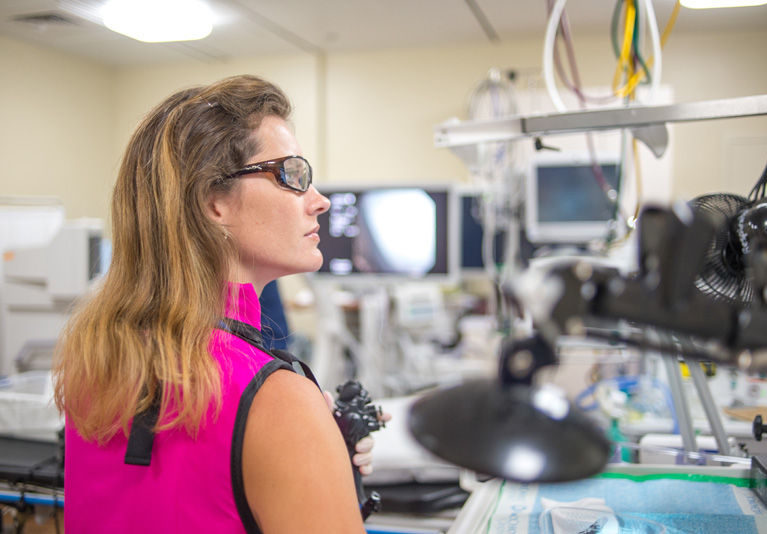
Dr. Ashley Canipe, interventional gastroenterologist, just joined the staff at Indian River Medical Center in mid-August and is already performing impressive procedures new to Indian River County. Even more innovative technology, Canipe says, is on its way.
One of the new procedures she employs is called endoscopic ultrasound (EUS) with fine needle aspiration (FNA). She is the first physician in this area to put this technique into practice.
The endoscopic ultrasound uses sound waves to “look” through the wall of the gastrointestinal tract. It allows physicians like Canipe to see things not typically visible – such as early stage tumors – during a traditional endoscopy. A hyper-thin FNA needle then obtains a tissue sample.
“Tissue,” exclaims Canipe, “is the issue in medicine.”
That’s especially true in cancer cases.
“An oncologist,” Canipe explains, “is going to be reluctant to offer any sort of treatment – especially aggressive treatment – without a tissue diagnosis of cancer.”
Without the FNA needle, the gastroenterologist would have to cut into the organ he or she suspects might contain a cancerous tumor using a scalpel in order to get a tissue sample.
Inserting a fine needle is far less intrusive, entails fewer risks and requires significantly less recovery time for the patient.
Other new tools in the bag of this Emory University graduate, who completed advanced fellowships at both Vanderbilt and Florida Hospital Orlando, are digital spyglass cholangioscopy and radio frequency ablation.
“Cholangio is just a prefix that means bile duct mostly, so if you think about it, cholangiocarcinoma, that’s bile duct cancer,” says Canipe. “It’s basically putting a tiny flexible camera up into the bile duct to look at it directly and take targeted samples.”
Radio frequency ablation, meanwhile, is a minimally invasive procedure using electrical energy and heat to destroy cancer cells by guiding a different type of needle into cancer tissue and using high-frequency energy to kill it.
Down the road, according to Canipe, IRMC will be adding other first-in-the-area procedures. She says, “We’ll also be bringing single-balloon enteroscopy,” as a technique to diagnose cancer of the small bowel. “That’ll be here in a couple of months.”
Gastroenterology or GI is a far more complex and encompassing discipline than most people realize. It treats the entire human digestive system from where food enters the body as nutrition to where it exits the body as waste.
Canipe and her colleagues are charged with helping patients maintain digestive health from the esophagus to the stomach to the small intestine, the colon, the pancreas, the gallbladder, the bile ducts and the liver all the way down to the rectum.
According to the American Society of Gastrointestinal Endoscopy, that’s about nine meters or 30 feet of real estate to cover in the average adult.
Whether they are looking for, finding and treating cancer, colon polyps, hepatitis, gastro-esophageal reflux, peptic ulcers, colitis, irritable bowel syndrome, pancreatitis, Barrett’s esophagus or a host of other conditions, gastroenterologists like Canipe are constantly embracing the newest technologies.
Of course, not everyone’s dream job involves dealing with other people’s bowels and bile ducts let alone the problems of their stomachs or small intestines. But then, not everyone has been as inspired and personally motivated as Canipe.
“When I was in medical school,” Canipe recalls, “I was deciding between infectious disease and some more procedural-related types of specialties and my mom – right at that point in my life when I was making these decisions – actually had a massive upper GI bleed. She was found unconscious on the bathroom floor.”
“Fortunately, someone found her and she made it to the emergency room and was in the ICU. A gastroenterologist came, of course, and scoped her and found that she had an ulcer with a visible vessel that was actively bleeding. They put a metallic clip on the vessel and she got a few pints of blood and she was transferred out of the ICU the next day and was home two days later and made a complete recovery and was at work later that week.”
“I thought it would be pretty satisfying,” says Canipe, “if I could do something like that in my own career. That was the start of really seriously considering GI. Then I did more rotations in it and I decided that’s what I wanted to do.”
That’s the motivation. But what about the job satisfaction?
“I like it,” beams the interventional gastroenterologist, “because it has such an amazing blend of practices. I’m fortunate enough to see patients in clinic, in the hospital, in out-patient endoscopy, in-patient endoscopy and then not only that, I do a wide variety of procedures. That’s one of the reasons that I took an additional year to sort of broaden my GI toolbox, so to speak. I do endoscopic ultrasounds. I do radio frequency ablation. I do balloon enteroscopy and the spyglass procedures. It lets me develop a real intimate relationship with my patients.”
For Canipe, gastroenterology is a gratifying career choice, a tribute to her own mother and a specialty that is constantly evolving as new technologies are introduced.
Dr. Canipe’s office is at 3745 11th Circle, Suite 101 in Vero Beach. The phone number is 772-299-3511.



